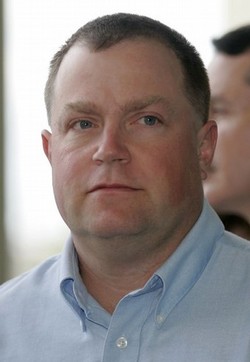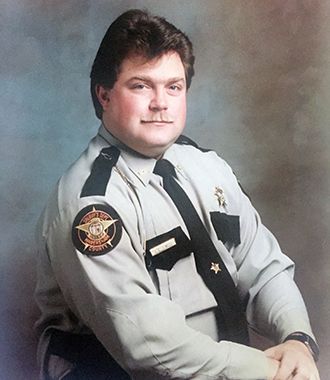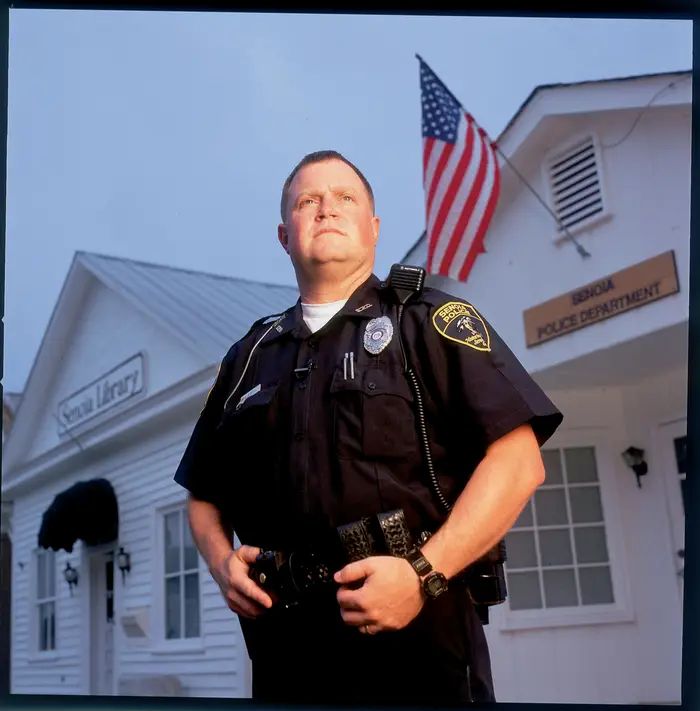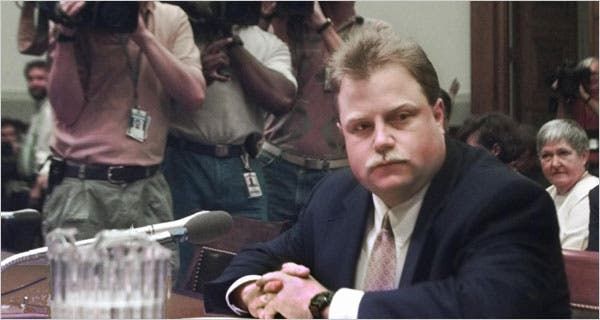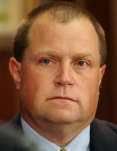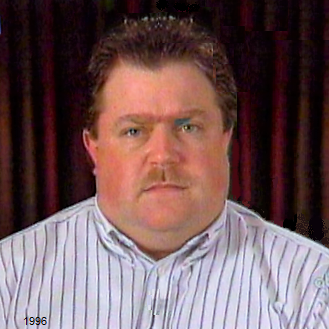Jewell was found dead in his west Georgia home, Georgia Bureau of Investigation spokesman John Bankhead said.
"There's no suspicion whatsoever of any type of foul play. He had been at home sick since the end of February with kidney problems," said Meriwether County Coroner Johnny Worley.
The GBI planned to do an autopsy Thursday, Bankhead said.
Lin Wood, Jewell's longtime attorney, said in an e-mail to The Associated Press that he was "devastated" by the news.
Wood, who was in New York trying to get back to Atlanta, said in a follow-up e-mail that Jewell's legacy "is that of a devoted and loving son, husband and friend."
Wood described Jewell as "a dedicated public servant whose heroism the night of the Centennial Olympic Park bombing saved the lives of many people."
"He will be missed, but never forgotten," Wood said.
Jewell was initially hailed as a hero for spotting a suspicious backpack in a park and moving people out of harm's way just before a bomb exploded during a concert at the Atlanta Summer Olympics.
The blast killed one and injured 111 others.
Three days after the bombing, an unattributed report in The Atlanta Journal-Constitution described him as "the focus" of the investigation.
Other media, to varying degrees, also linked Jewell to the investigation. The AP, citing an anonymous federal law enforcement source, said after the AJC report that Jewell was "a focus" of investigators, but that others had "not yet been ruled out as potential suspects."
Reporters from around the country set up camp outside Jewell's mother's apartment in the Atlanta area and his life was dissected for weeks by the media.
He was never arrested or charged, although he was questioned and was a subject of search warrants.
Eighty-eight days after the initial news report, U.S. Attorney Kent Alexander issued a statement saying Jewell "is not a target" of the bombing investigation and that the "unusual and intense publicity" surrounding him was "neither designed nor desired by the FBI, and in fact interfered with the investigation."
In 1997, U.S. Attorney General Janet Reno expressed regret over the leak regarding Jewell. "I'm very sorry it happened," she told reporters. "I think we owe him an apology."
Eventually, the bomber turned out to be anti-government extremist Eric Rudolph, who also planted three other bombs in the Atlanta area and in Birmingham, Alabama. Those explosives killed a police officer, maimed a nurse and injured several other people.
Rudolph was captured after spending five years hiding out in the mountains of western North Carolina. He pleaded guilty to all four bombings last year and is serving life in prison.
The Jewell episode spurred lawsuits and soul-searching among news organizations about the use of unattributed or anonymously sourced information.
Jewell sued several media companies, including NBC, and settled for undisclosed amounts with them. The Atlanta Journal-Constitution never settled a lawsuit Jewell filed against it.
According to Wood, Jewell also settled lawsuits against CNN, the New York Post and Piedmont College, a former employer of his. The amounts were confidential, Wood said.
Wood said Wednesday that the AJC lawsuit is set for trial in January.
"I expect to pursue it for Richard and his estate," Wood said. "But that is a decision for a less sad day."
A lawyer for the newspaper, Peter Canfield, did not immediately return several calls seeking comment. Canfield has said previously that the newspaper stands by its coverage of Jewell.
Jewell, in an interview with AP last year around the time of the 10th anniversary of the Olympic bombing, insisted the lawsuits were not about making money - he bought his mother a place to live and gave 73 percent of the settlement money to his attorneys and to the government in taxes - but about making sure the truth was told.
"I'm not rich by any means monetarily," he said at the time. "I'm rich because of my family. If I never get there, I don't care. I'm gonna get my say in court."
Jewell also said that Rudolph's conviction helped, but he believed some people still remember him as a suspect rather than for the two days in which he was praised as a hero.
"For that two days, my mother had a great deal of pride in me - that I had done something good and that she was my mother, and that was taken away from her," Jewell said. "She'll never get that back, and there's no way I can give that back to her."
A year ago, Gov. Sonny Perdue commended Jewell at a bombing anniversary event. "This is what I think is the right thing to do," Perdue declared as he handed a certificate to Jewell.
Jewell said: "I never expected this day to ever happen. I'm just glad that it did."
Since the Olympics, Jewell worked in various law enforcement jobs, including as a police officer in Pendergrass, Georgia, where his partner was fatally shot in 2004 during a pursuit of a suspect. Jewell said he was honored by the city, which is 49 miles (78 kilometers) northeast of Atlanta, for his bravery during the chase. As recently as last year, Jewell was working as a sheriff's deputy in west Georgia. He also gave speeches to college journalism classes about his experience with the media.
Jewell was found dead in his west Georgia home, Georgia Bureau of Investigation spokesman John Bankhead said.
"There's no suspicion whatsoever of any type of foul play. He had been at home sick since the end of February with kidney problems," said Meriwether County Coroner Johnny Worley.
The GBI planned to do an autopsy Thursday, Bankhead said.
Lin Wood, Jewell's longtime attorney, said in an e-mail to The Associated Press that he was "devastated" by the news.
Wood, who was in New York trying to get back to Atlanta, said in a follow-up e-mail that Jewell's legacy "is that of a devoted and loving son, husband and friend."
Wood described Jewell as "a dedicated public servant whose heroism the night of the Centennial Olympic Park bombing saved the lives of many people."
"He will be missed, but never forgotten," Wood said.
Jewell was initially hailed as a hero for spotting a suspicious backpack in a park and moving people out of harm's way just before a bomb exploded during a concert at the Atlanta Summer Olympics.
The blast killed one and injured 111 others.
Three days after the bombing, an unattributed report in The Atlanta Journal-Constitution described him as "the focus" of the investigation.
Other media, to varying degrees, also linked Jewell to the investigation. The AP, citing an anonymous federal law enforcement source, said after the AJC report that Jewell was "a focus" of investigators, but that others had "not yet been ruled out as potential suspects."
Reporters from around the country set up camp outside Jewell's mother's apartment in the Atlanta area and his life was dissected for weeks by the media.
He was never arrested or charged, although he was questioned and was a subject of search warrants.
Eighty-eight days after the initial news report, U.S. Attorney Kent Alexander issued a statement saying Jewell "is not a target" of the bombing investigation and that the "unusual and intense publicity" surrounding him was "neither designed nor desired by the FBI, and in fact interfered with the investigation."
In 1997, U.S. Attorney General Janet Reno expressed regret over the leak regarding Jewell. "I'm very sorry it happened," she told reporters. "I think we owe him an apology."
Eventually, the bomber turned out to be anti-government extremist Eric Rudolph, who also planted three other bombs in the Atlanta area and in Birmingham, Alabama. Those explosives killed a police officer, maimed a nurse and injured several other people.
Rudolph was captured after spending five years hiding out in the mountains of western North Carolina. He pleaded guilty to all four bombings last year and is serving life in prison.
The Jewell episode spurred lawsuits and soul-searching among news organizations about the use of unattributed or anonymously sourced information.
Jewell sued several media companies, including NBC, and settled for undisclosed amounts with them. The Atlanta Journal-Constitution never settled a lawsuit Jewell filed against it.
According to Wood, Jewell also settled lawsuits against CNN, the New York Post and Piedmont College, a former employer of his. The amounts were confidential, Wood said.
Wood said Wednesday that the AJC lawsuit is set for trial in January.
"I expect to pursue it for Richard and his estate," Wood said. "But that is a decision for a less sad day."
A lawyer for the newspaper, Peter Canfield, did not immediately return several calls seeking comment. Canfield has said previously that the newspaper stands by its coverage of Jewell.
Jewell, in an interview with AP last year around the time of the 10th anniversary of the Olympic bombing, insisted the lawsuits were not about making money - he bought his mother a place to live and gave 73 percent of the settlement money to his attorneys and to the government in taxes - but about making sure the truth was told.
"I'm not rich by any means monetarily," he said at the time. "I'm rich because of my family. If I never get there, I don't care. I'm gonna get my say in court."
Jewell also said that Rudolph's conviction helped, but he believed some people still remember him as a suspect rather than for the two days in which he was praised as a hero.
"For that two days, my mother had a great deal of pride in me - that I had done something good and that she was my mother, and that was taken away from her," Jewell said. "She'll never get that back, and there's no way I can give that back to her."
A year ago, Gov. Sonny Perdue commended Jewell at a bombing anniversary event. "This is what I think is the right thing to do," Perdue declared as he handed a certificate to Jewell.
Jewell said: "I never expected this day to ever happen. I'm just glad that it did."
Since the Olympics, Jewell worked in various law enforcement jobs, including as a police officer in Pendergrass, Georgia, where his partner was fatally shot in 2004 during a pursuit of a suspect. Jewell said he was honored by the city, which is 49 miles (78 kilometers) northeast of Atlanta, for his bravery during the chase. As recently as last year, Jewell was working as a sheriff's deputy in west Georgia. He also gave speeches to college journalism classes about his experience with the media.
Bio by: John Sheets
